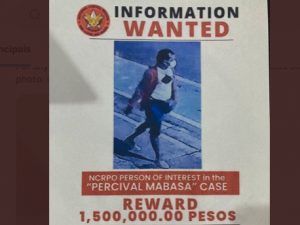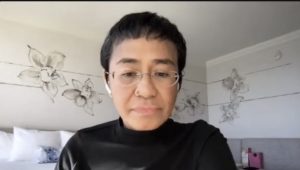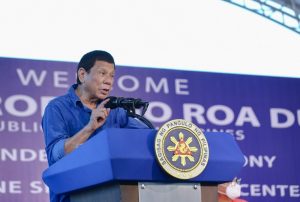A year after Filipino journalist Maria Ressa was announced as one of the winners of the Nobel Peace Prize, the death of one of the country’s most famous publishers shocked the Philippines.
Percival Mabasa, known as Percy Lapid, 63, was shot in the head in his car by two men on motorcycles on Monday on his way to work in the capital, Manila.
This Friday, police showed a photograph of a suspect, asking him to surrender, and offered a reward of 1.5 million Philippine pesos (R$254,000) for information leading to his arrest.
Journalist condemns ‘red labeling’ in Philippines
Ferdinand Marcos Jr. government critic. and his predecessor, Rodrigo Duterte, the death of Mabasa sparked sudden international riots and protests on the streets of the Philippines.
Governments from the US, Canada and France are among those prominent among those demanding investigations and lamenting the death’s impact on press freedom, deterring journalists from condemning crimes and bad practices, the so-called “deterrent effect.”
HE The Nobel Peace Prize was shared last year between Filipino Maria Ressa from the Rappler website and Dmitry Muratov of Russian car Novaya Gazeta.did not ease tensions between journalists and Philippine authorities.
Percival Mabasa’s death was the second death by a media professional since Marcos Jr. He took office on June 30, according to the National Union of Journalists of the Philippines (NUJP).
On September 18, another broadcaster, Rey Blanco, died after being stabbed in a crime that was also being investigated by the police. According to the Committee to Protect Journalists (CPJ), it is not yet possible to link this case to Blanco’s work.
Also Read | Nobel Peace Journalist’s Philippines Website License Revoked; Rappler promises to resist
Mabasa, who hosted the ‘Lapid Fire’ program on DWBL 1242 radio, talked about the dangers of the ‘red labeling’ tactic used by the government to intimidate the press and rights activists in his latest broadcasts on his YouTube channel. . associating people with communist or terrorist groups.
“This murder shows that journalism continues to be a dangerous profession in the country,” NUJP said in a statement. “The fact that it took place in Metro Manila shows how brazen the attackers were and how the authorities failed to protect journalists and ordinary citizens from harm.”
Join us in condemning another journalist murder.
Justice for Percy Lapid! pic.twitter.com/prytGWY2cO
– NUJP (@nujp) October 4, 2022
Journalist Roy Mabasa, also known as the brother of the radio host, issued two notes on behalf of the family condemning the murder and demanding an investigation by the authorities:
“My brother Percy, known to thousands of loyal listeners worldwide as Percy Lapid, was ambushed on his way to the studio where he was broadcasting his show Lapid Fire.
He was a wonderful family man, a loving father to his children, and a devoted husband to his wife, Liza. I will always remember my brother with his deep faith in God and undying love for his country.”
“We are deeply saddened and outraged by the brutal murder of fearless publisher, father and husband, brother and friend, Percy Lapid. We strongly condemn this deplorable crime not only against Percy, his family, and his profession, but against our country and the truth.
Percy was loved by many and highly respected by his colleagues, admirers and enemies. His bold and sharp comments broke through the barrage of fake news on radio waves and social media. We demand that your murderous cowards be brought to justice.”
Filipinos take to the streets to protest journalist’s death
In the wake of the repercussions of Percival Mabasa’s death, the Presidential Task Force on Media Safety, a government body made up of several government agencies, announced it would investigate the case.
According to the agency, initial findings indicated that the crime was “related to the victim’s job,” but was hasty in identifying this as the cause of the attack.
At a press conference on Monday, investigators presented the footage of the suspect, who was caught by the security camera, and said they had already contacted him and asked him to surrender, but did not provide the motivation for the crime.

Dozens, including media professionals and human rights defenders summoned by the union, took to the streets of the Philippines to protest the journalist’s death.
Melanie Feranil @CEGPFilipinos PH refers to attacks on independent media. The campus press has also been subject to red-tagging, surveillance and other violations, he says. pic.twitter.com/gViqISZ08O
– NUJP (@nujp) October 4, 2022
“The murder of radio journalist Percival Mabasa demonstrates once again that the Philippines remains one of the most dangerous places for journalists,” said Beh Lih Yi, CPJ’s Asia program coordinator.
“President Ferdinand Marcos Jr. It must end the culture of impunity in killing Filipino journalists. This cannot continue,” he added.
The Philippines was ranked seventh in CPJ’s 2021 Impunity Index, which assesses countries worldwide where journalists have been killed and murdered free.
Also Read | Duterte government blocks independent media in Philippines for ‘communist link’
source: Noticias

